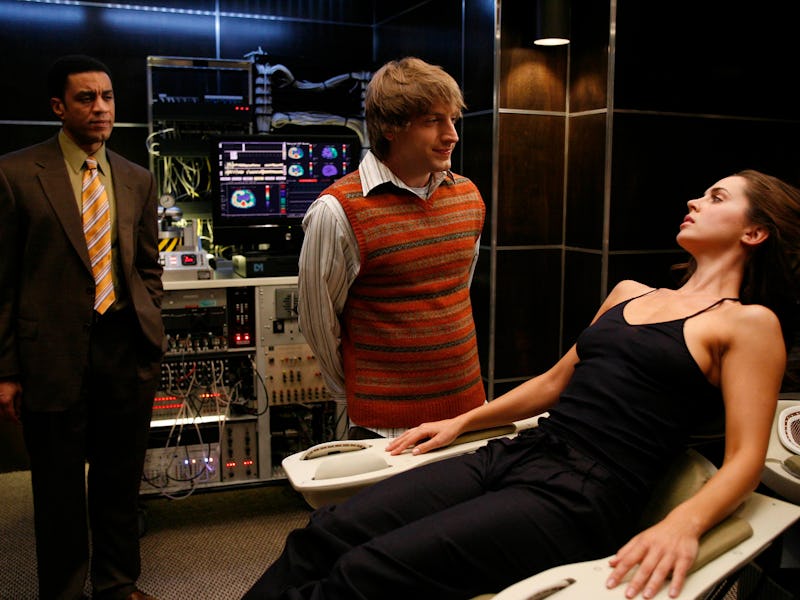One of the Most Underrated Sci-Fi Gems of the 2000s Was Decades Ahead of the Curve
Before Severance, there was Dollhouse.

Science fiction television of the 2000s was a strange beast. The impact of The X-Files in the ‘90s was undeniable, and the genre — previously known for shows like Star Trek and V — began to lean into its prestige possibilities, with the cultural ascendance of J.J. Abrams shows like Lost and Fringe. Buried beneath these landmark sci-fi endeavors was Dollhouse, a short-lived and often-forgotten gem that blended a traditional network drama format with ambitious themes.
Created by Joss Whedon in 2009 in the wake of Buffy the Vampire Slayer and Firefly, the series follows a secret facility known as the Dollhouse, where a select group of elite men and women with wiped memories live. For a hefty price, the facility rents out these “actives” with specific imprinted personalities and skillsets to help their high-roller clients. After each mission, their memories are wiped and they revert to blank canvases awaiting a new mission. The science is both intricately explained and heavily glossed over, with some exacting details allowing for the illusion that this brain-tampering technology makes sense and could exist today (if you don’t think about it too hard).
Buffy alum Eliza Dushku stars (and produces) as Echo, one of the most versatile and impressive dolls. She is rented out to serve a variety of purposes, including as a hostage negotiator, a midwife, a heist leader, and a no-strings-attached hook-up for an unforgettable weekend. Every mission she undergoes is done with total commitment and expertise (and no clue on her end that she’s not the person she’s pretending to be). Her neutral reversion post-mission comes with a child-like innocence, which makes it all the more rewarding as viewers start to see her gain some personality and bite.
In the first season of the FOX series, Echo and some of the other dolls begin to exhibit a few small glitches: mainly in the form of connection to each other. Echo becomes friends with fellow doll Sierra (Severance star Dichen Lachman) and, later, two of the dolls develop romantic feelings for each other. As the series goes on, Echo also begins to recover some stray memories of her past life. The greater mystery is how these people came to be at the Dollhouse, especially Echo, who we learn in the opening scene of the show was a young woman named Caroline who felt she had no choice but to submit to a five-year stint in the Dollhouse.
Viewers aren’t the only people wondering about the Dollhouse. While the facility goes to great lengths to remain anonymous and avoid detection by federal agencies, a lone FBI agent (Tahmoh Penikett) is on the case, especially after he gets a tip about Echo/Caroline from a rogue former active. In addition to a solid performance from Dushku, the supporting cast — including excellent, on-brand roles for Fran Kranz, Amy Acker, and Enver Gjokaj — helped make the series so memorable.
Dollhouse transcended its procedural premise to explore questions of identity and personhood.
The show was a strange, inventive byproduct of 2000s network TV. It plays like an episode of Alias mixed with The Blacklist (Harry Lennix from The Blacklist even stars as Echo’s devoted handler). Although the series starts a bit slow, the sixth episode marks a strong and definitive shift. It features a twist for the ages and begins to lean into the true integrated sci-fi side of the show, via hilarious and informative documentary-style intercuts that unpack some of the lore surrounding the Dollhouse, including the fact that the Los Angeles location is just one of more than 20 houses around the world (which leaves the organization with unlimited political and financial connections).
It’s a great expansion on the case-of-the-week formula which, by the late 2000s, had overtaken most primetime broadcast slots in the form of crime procedurals. But Dollhouse hinted at even more than a classic procedural and, as it headed into a second season, started to ask heavy questions about existence and individuality. Although the series was ultimately canceled after less than a year on-air (during which time it pumped out an impressive two seasons), it dealt with themes of identity, memory, and work-life entanglement that resonate today. In our current era of television, where shows like Severance and Westworld reign supreme, it appears that Dollhouse was just a decade or so ahead of the curve in its search for meaning in a technology-laden world.